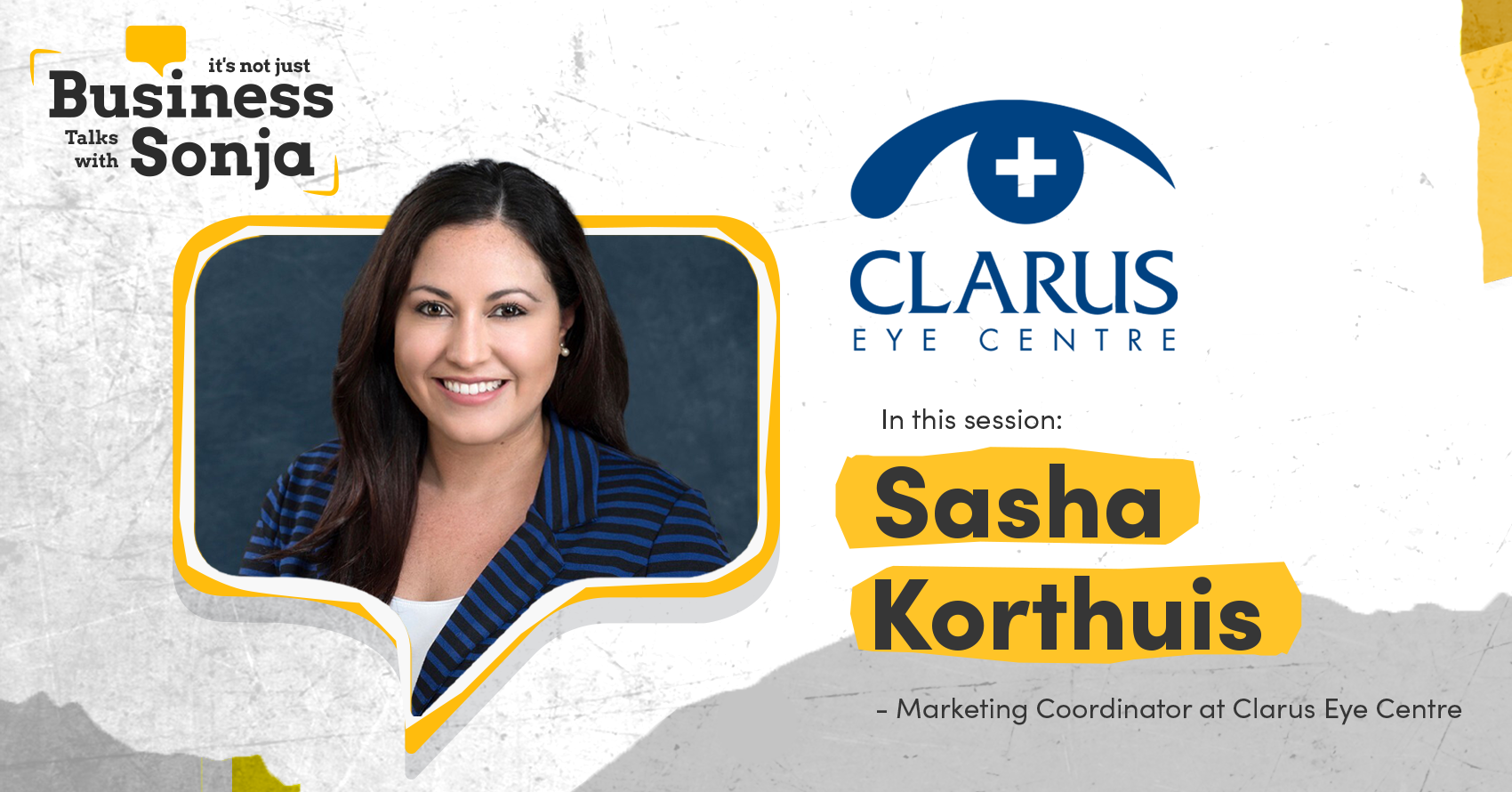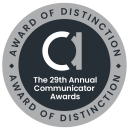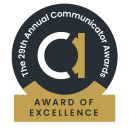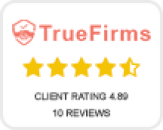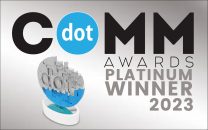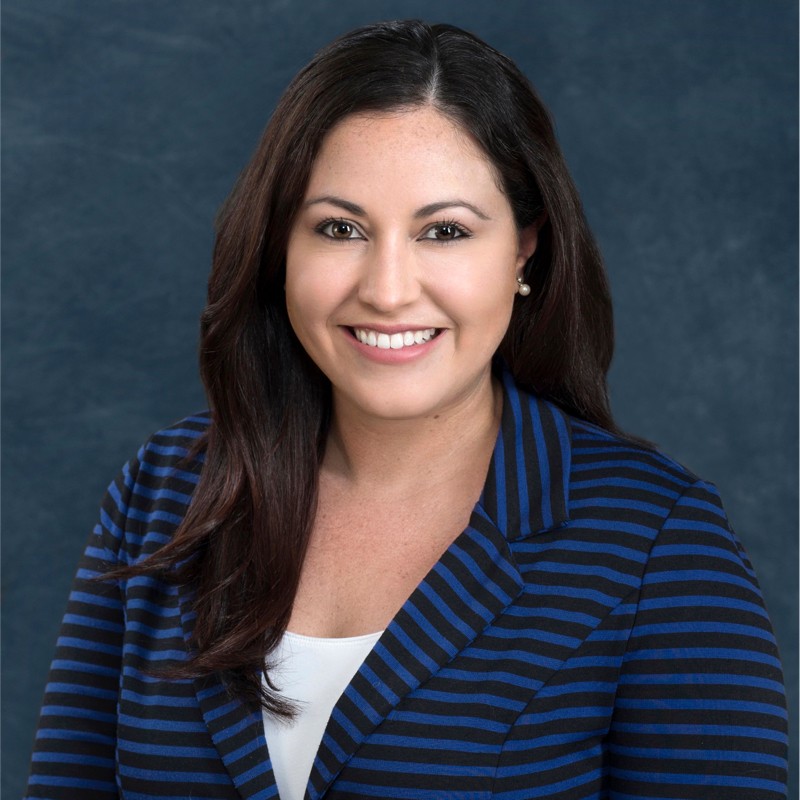
Sasha is an Experienced marketing professional with excellent communication skills and a passion for customer service.
Well-versed in both online and offline marketing campaigns designed to increase sales, boost brand awareness and attract new clientele.
Team player with a proven ability to multitask, perform well under pressure and an aptitude toward leadership.
Transcript:
Welcome to It’s Not Just Business Talks with Sonja, where we get down to the real business of how great leaders dug through their own trenches and climb some epic mountains to get where they are today. Now, let’s get started with the show.
Sonja: I’m here today with Sasha Korthuis, the marketing coordinator at Clarus Eye Centre. The Marketing Coordinator at Clarus Eye Centre. We’ve been working with for a little while.
Sasha: Hello!
Sonja: Hello, Sasha is… I’ve got your bio here, so I’m going to read it. Experienced marketing professional as you are, with excellent communication skills and a passion for customer service. Well-versed in both online and offline marketing campaigns designed to increase sales, boost brand awareness, and attract new clientele. Players with a proven ability to multitask, perform well under pressure, and have an aptitude toward leadership. That’s summing up. Is that you?
Sasha: I mean, that’s a quick snow version, for sure.
Sasha: So really tell me just before we go into anything more bizarre like the fact that my dog’s sitting on the floor here, what is it your job is? What’s a marketing coordinator? What do you do?
Sasha: Yeah, I think that it’s one of those you work for the size of a business. I do. So I came from originally I worked for a much, much larger company and I was primarily in sales and doing a lot of coordinating different marketing campaigns for different customers based on their needs. And the thing that I was good at it, I enjoyed it, but the thing that I had a hard time with was not getting to see a campaign through to the end all the time. So I would have a small part in a larger picture of their marketing campaign and I would handle a certain component of it, say handling specifically just the search or specifically just the print, print portions. And so I would do a lot of things for a lot of different businesses. And I did that for twelve years before I decided I was ready to move on and try to see if I could utilize the skills that I had learned for one business and try to have my hand in a little bit of everything. Which is why I was looking for a medium, small, medium-sized business I could handle everything for. And that is what I got. So now I’m truly handling a lot of everything related to the space that we put out there, to the community, and the brand that we’re trying to represent and promote.
Sonja: You are doing a little bit of everything. So a little bit of everything means to me we beacuse do that. But is the internal culture and branding and sort of the team all being on the same page about who you are, what you stand for, then your assets, like your web, but then the external invoice.
Sasha: That’s where it starts to become a lot. And I truly rely on help from a lot of different people in my organization who don’t even really realize that they’re affecting marketing or that they are influencing it, or that they’re helping me in some capacity by helping to manage, say, the reviews that we get. I’m the one that responds to them and I get the alerts on everything. But I need the back story. I need to know what happened. I need to know the full situation of why a customer might not have been happy with their experience so that I can respond to it appropriately. And that takes a lot of people getting that full story of what happened and then from there… okay, where is there an opportunity to correct the issue internally so that we can then move forward and try not to have this happen again in the future? And sometimes its process, sometimes it’s personnel or whatever it might be. There are over 100 people in our organization. Sometimes the right hand doesn’t always talk to the left hand. That’s partly where I come in as far as internal marketing goes.
Sonja: Huge, you know, Sasha? Most organizations don’t take advantage when we receive a negative review. That’s a beautiful opportunity. And if you’re responding to it and you’re being able to integrate that internally, I would say 90% of companies I’m just pulling that number out don’t realize that they could be benefiting from good or bad reviews.
Sasha: Yeah. Well, especially somebody that is connected to what our external messaging is and what our face is supposed to be in the community. And we have, well, technically now two locations
Sonja: Did you have to build a place, too?
Sasha: No, we have been looking for the right opportunity… not to be jumping around.
Sonja: No, it’s okay. I told you I followed it.
Sasha: Yeah. Now, we had been looking for the opportunity for a while in the right place and the right time and all of that. And obviously, as it has for everyone, COVID through a giant wrench and things, we were definitely ready a couple of years ago to be making this next step. But the owners in the past, they at one point tried to open a satellite in Dupont, and for various reasons, it wasn’t researched as well as it could have been. And there were a lot of factors contributing to why that wasn’t as successful as they hoped it would be. So there was a lot of hesitancy going forward. That, okay, we’re in a position now to open the second location, but it really has to be well researched, well planned, well thought out so that we know it’s going to be successful. And I think it was about a year ago, I think that they started noticing an increase or an influx of patients coming from the Yelma area and beyond, and not just because of the growing population. There were a lot of factors involved in that. But the owners had a relationship or close, one of the doctors, one of the managing doctors, or I believe one of the owners at the Yom family medicine practice. And for whatever reason… I mean there are a lot of reasons going into why, but they knew that there was going to be an opening in their building coming up within a few months.So we just kind of swoop. It really was the perfect match and a lot of things fell into place the way that they should have. But we had to move very quickly and in some cases quicker than we were ready for. So we had to put a lot of things on pause so that we could turn it around as possible. There were a lot of factors that were involved in opening that. So anyway, yeah, I definitely was really heavily involved with a lot of that, down to helping choose the decor.
Sonja: They fund it.
Sasha: Yeah, they fund it.
Sonja: That’s the thing. You just described two really interesting, slightly different, but have some similarities. And that is when you have you said you did a lot of research and in order to secure, to be sure that this venture was going to be going to flesh out well, it sounds like that’s based on some not-so-solid experiences in the past. And so you take those and you learn from them and move on. And the thing is when you have a negative or less than a five-star review, you say, okay, what’s the interesting material here that we can act on and change internally, whatever we have to do that is powerful. I’m going to say again, I’ll raise my hand again, most people don’t. They follow their face one time and that’s it and we’re done. And we go on to something else.
Sasha: Yeah, well, I think that the owners are brilliant minds and they’ve got several of them are younger, so this is their future and, you know, you’re investing a lot into the future of this practice and what it means because from a broader perspective, you know, the healthcare industry, in general, is seeing a lot of change and a lot of movement around some of the larger conglomerates. I want to use negative terminology here, but our stop and taking over for practices like ours. And the owners do not want to see that because it’s not necessarily what’s beneficial for the community, because it would change a lot of what makes our practice successful in this area.
Sonja: Tell us about that. What is it that makes you… we can park it and come back, but I would say I would love to know what is it because you’re absolutely right. There are a lot of large businesses if you’re lucky and you start up not you, but if a software company is lucky and they do something right, they’re sitting there waiting to get bought out. That’s the goal, right? The goal is to get bought out and walk away with a bundle of money. And in your case, it’s absolutely not the goal. The goal is to maintain what is it that sets you apart.
Sasha: From my perspective, it’s changed over the years. I think when I first started there, it was, of course, everything nice and bright and shiny when you come to a clinic and you see the outside of what the community sees, because you see the face of what we’re trying to accomplish. But what I’ve learned over the years is that there is a lot of hard work that goes into maintaining a reputation from the ground up. And so what that means is that I think there’s a lot of energy and effort that goes into ensuring that the people that work for us are in the best position they can be to be successful, to be happy in their job, to have what they need to actually emulate that face that we’re trying to continue to maintain.
Sonja: And that’s true. I mean, that’s why I said you’re handling the course appropriately titled Coordinator, which it is. But internal… what happens to your internal team, especially with an organization with 100 plus people, is they have to love, embody and be enthusiastic about the brand, the work, and the service. Because one bad experience, like you said, is because we yield to a negative review and that takes you from 4.8 to 4.7. and this is all interconnected.
Sasha: And a lot of people don’t realize how much effect, I mean, one little thing can affect. It has a ripple effect and reaction. Part of my job is to try and catch those ripples, I guess, and correct them. They become a larger issue. Or if we have, on the flip side, talking about negative, which is few and far between, but on the flip side, really trying to make sure that positive, that positive feedback is shared internally as much as it is externally. So we want people to know when they’re doing a great job. And since I started there, there were some things in the past that they have tried to implement and as far as employee satisfaction, different things like that didn’t always pan out. And I got involved in a couple of people got involved. We got together and really had a discussion on what really matters to people. So there are some things that we put in place to help get those positive effects felt throughout the clinic. And I think there’s been a lot of really good improvements that I’ve seen over the last couple of years that have helped change, I think, what kind of patient care we’re giving and what it looks like to our community.
Sonja: Would you share like maybe three of those? Like whether things at another business and it doesn’t have to be in the same field or industry, is there anything in there that are nuggets that we could share?
Sasha: One thing is that we have multiple ways of asking patients for reviews because we know we have a lot of older patients, we have people that are younger. So when we have handwritten reviews from patients, specifically naming people that they had a great experience with, whether it’s a patient service representative, one of the technicians, or whatever it might be, we celebrate that every month. We have a monthly staff meeting where we actually close the clinic down and that’s something that we celebrate every month. And there’s different rewards and things, incentives that are fun, just celebratory things. But that makes such a huge difference. I don’t think a lot of people realize that you’re being recognized by your peers from a positive experience that happened with a patient that was recognized, that matters a lot. It’s not just that their manager goes up and tells them, hey, you had a patient that wrote a great thing about you, and a good job. All of their peers are hearing that as well, and they work with it every day. So I think people getting celebrated in a way that is beyond just their paycheck makes such a huge difference. Everybody’s there to make money, everybody’s there to work but we want to feel, we really want to foster. I think a lot of people say family environment, and that is something that has been overdone in some cases. We know that we’re not family, we’re coworkers, but we spend a lot of time with each other, and we go through a lot, especially in the healthcare industry. I think it’s a little harder sometimes because you’re working with people who are going through a really hard time and medically, and oftentimes we’re seeing patients who are on the verge of losing their vision and their shoes, which a lot of our employees are very good at doing. The empathy that they have for people is a really beautiful thing to see and it matters a lot to people when they’re going through some of the scariest times in their life. And I’ve seen some of our people go above and beyond to help people that you wouldn’t. It’s just what you do. And nobody wants to in those cases. There’s a lot of people that don’t want to be recognized for that kind of thing
Sonja: Which is a really important thing to be recognized for when your empathy and humanity take you beyond what the job requires. But just I’m human. I see this human. And that could be with a coworker. I mean, you’ve all had it, I don’t know, in my 20s, maybe when we’re in college or you work in the restaurant business, and I swear, the restaurant business, at the end of the day, you kind of have to let off steam and say, did you see that one table, or did you see co-workers tend to have to let off steam with each other? And also their heartache if they did work with a patient who’s about to lose their vision and that feels… I could never be a nurse for that reason. It just would be too consistently heartbreaking.
Sasha: Yeah. I think especially when there are unique circumstances different circumstances of people that are going through other things in their life, and then on top of that, they have to worry about what’s happening with their site. And I will say that starts from the leadership at every level of people that we have working for us, and the doctors being some of the most I don’t think I’ve ever granted, I’ve never worked at another medical practice, but I have doctors. I have an autoimmune condition. So very familiar with medical offices. So seeing what some of these doctors do go above and beyond and to care for their patients is pretty incredible, and makes me very happy to work with a company that permits that attitude and messaging as much as possible.
Sasha: Well, I think one of the things that change that is that there are certain components of our practice, because it’s an ophthalmology, primarily an ophthalmology practice, there are certain components of it that patients have to come back again and again. And so it is a regular care situation in some places or in some cases where, you know, you have patients that have to come back once or twice a month on the regular basis in order to maintain their site. Especially in the retina care area, there are certain procedures that we offer that require a lot of follow-up, like ten appointments and within a period of three months. So because of that consistent care, there often relationships developed with people, and that’s where we find that long-term loyalty with a lot of patients where they’ve had not just one experience with us, or even if they did have even if it was a harder day, we do have days that are where we get backed up. Maybe there was an emergency. We offer emergency care services.
Sonja: I want to know what that sounds like, by the way. Emergency care services for the eyes sound like…
Sasha: Really bad stuff, because typically what happens is if there’s an acute major injury, they’ll typically go to the ER first and then they’ll just stabilize it. But we are doctors, it’s their goal and the job to try to save their vision from stabilizing. So there have been many situations over the years, of course,
Sonja: But I was going to ask you, Sasha, did you know all about this field before you got into this role as a marketing coordinator?
Sasha: Not all about it, but when I worked in my previous life, I was a healthcare representative. So all of my businesses that I worked with, which were anywhere from 20 to 25 per month, depending on that, I would be doing different campaigns or different things for we’re all healthcare businesses. So I did have a familiarity with working with that type of clientele, working with doctors who can sometimes be
Sonja: doctors can be, as is very understandable, like you said, with an emergency, they can be sidetracked, sure, very quickly
Sasha: And they also have typically a certain personality type as far as they’re very focused on as they should be. They have a different personalities, brain type to be able to do some of the things that many of us would never attempt to do and also the smarts for it. So you have to kind of know how to guide conversations and talk to people like people that have that mindset and the way that they think so that we can make sure that the bigger picture is addressed and whatever it might be. Because they can sometimes get focused on a particular issue is what I find. And so when I’m having a conversation with one of the doctors about a campaign or about marketing, I oftentimes will kind of gauge whether it’s an issue. “Okay. Do they need to know the bigger picture or is it going to be overwhelming for them? Or do we need to focus on a particular thing and keep them focused on what matters and let me worry about the other stuff?” So I have to kind of dial that up.
Sonja: Absolutely. I don’t know if your brain is this way. I always tell people I think in circles, I am a creative. I can have 20 plates in the air, no problem. My husband is a linear, so he sings in a straight line and there’s no deviation from the straight line. So he just has to go this way until the thing that’s right in front of him has been resolved and then he can go on to the next thing in the straight line. And his family are all teachers, professors, they’re doctorates, whatever. And so that’s how they think. And I understand. So when I try to present an idea, it could be anything. Where should we go for dinner? I have to do exactly that, Sasha. You have to figure out what’s the roadblock right here. Move that out of the way. Keep going.
Sasha: And I think that just comes a time and experience, too, as we get older. And I just had to learn that you talk differently to different people so that you can get to your goal without being in the room for 2 hours.
Sonja: You’re in a circle. You are because you’re holding space for the people that you need to have internally be influenced by or make decisions about some of the work they’re doing, the internal team and how they are feeling and experiencing and showing up for work and their clients, basically your patients. And then the outside world, you have to tell that story too. I like the title Marketing Coordinator. We like to also say director because it feels like air traffic control just kind of everything flying.
Sasha: And that’s how I see my daily life. It is like a little bit of air traffic control. And I sprinkle the psychology in there and I think that’s what keeps me engaged on a daily basis. I truly do not have the same day every day. There are days where I feel like “oh my God, I’m stuck on my computer all day and this is too much” And when that happens, I know that tomorrow I can go into the office and I will come to my computer at all. I will probably be talking to ten people about ten different things and I’ll be walking around or, you know, part of my job is also outreach. So I could go into some of the referring providers and I could say hi to them and see how things are going from a comanagement perspective. Because we do have a lot of patients that their optometrists are for a private practice, smaller optometrists and then they come to see your ophthalmologist for the other issues. So we do have patients that we share with other practices that does take a lot of finesse. So we have a whole team of people that is all they do is make sure that the referral process, the comanagement process runs smoothly so that we are not burning any bridges and making our providers happy. And yeah, so that’s part of my job too. So I could certainly mix it up if I start to get bored with anything.
Sonja: And I know that we’re kind of leaning into the end of time here, but do you ever feel like all the boxes are checked and you can go take a day off? Or does it always feel like Tetris, like you get a few of them and then some more?
Sasha: I will say I have gotten better over the years. Just from a personal level of kind of letting things go and being like, okay, this is truly you were doing everything you are capable of from your perspective and your abilities, right? And if I just give myself that, afford myself that I am able to kind of let it go and enjoy.
Sonja: If all of your boxes aren’t checked.
Sasha: I just had to learn that because I used to not I used to not be that way. I used to not let it go. I used to think like “I could always be doing more, I could always be working on whatever it might be to improve this part of my job”. And it’s great to have that mentality, but it’s not sustainable for the long term for anyone’s mental health to think you’re not doing enough all the time. And I kind of got into a position for a little while where I was kind of feeling like I wasn’t doing a good enough job. Even though I have people telling me how great of a job I’m doing and telling me that they’re pleased with my work. But I realized that was my own standards that I was leaving too high and I’m much, much happier and much more productive with what I’m doing if I allow myself to accept that.
Sonja: Were you working after hours and doing all of the things?
Sasha: for a long time, especially at the beginning of this position, I was doing a lot of extra time, and it was needed, I think, at the time, there was a lot that had to be grown from the ground up. There wasn’t when I started, we did not have the presence we have now. We didn’t have the digital expression, all of that, the SEO level, and I needed a lot of help with that, the relationship here. But yeah, there was a lot of things that needed to be reworked from the ground up.
Sonja: You came in and you saw what was working, what wasn’t working, what could be manipulated?
Sasha: Well, this is not to say anything negative about my predecessor. It was just a different time, I think, where the marketing or the outreach that was done on a more face-to-face level, it wasn’t necessarily… it didn’t need to be as digital, as online as…
Sonja: Oh my God, you just put a full page and not you, but people used to just put a full-page ad in the Yellow Pages and get all the calls. And that was the way that you didn’t get reviews either.
Sasha: That was true even just a few years ago for businesses like ours that primarily serve older, older audiences. That was still true a few years ago. And I think that’s what a lot of businesses or people don’t quite understand is they’re like, why don’t we have this going on ten years ago when things did start to decline on the print side or whatever, because our clientele, our audience, was still using the things up to just a few years ago. So we had to really kind of start to once were able to get in with, okay, so where the data associated with how successful this is?
Because obviously a lot of things just come back to the numbers, right?And I was able to prove that, okay, we are at that pivotal turning point now, where our target audience, we are still in that upper range, but we also have to start building that long-term clientele with a younger audience that is going to sustain us into the future so we have to start making those changes and most of, yeah, hence all the extra time in the beginning, and I think now we’re at that we’re at a point where a lot of things are running much more smoothly and that affords us some flexibility to be like. OK. Now we’re at a point where we can really say. Okay. That’s working great. But maybe there’s some tweaks that could help it work better whatever it might be. And to put much more energy into the content that we’re putting out there. The story that we have. So we do it too.
Sonja: Sasha, we do it too and I always say it’s the old story. The housekeeper’s house is always the dirtiest. I feel that way about us. We do a lot of content work for an agency, and it never feels like we can get enough or we can keep it as updated because of course we have to work with if we need that more than we need it. o I remember the yellow pages. My father-in-law I’m going to watch this. But when you’re blind but he’s not blind. He’s at 40. So he was what do you call that, Sasha? I can’t remember it off the top of my head right now. He can’t drive, but he can still see with thick, thick, thick glasses. But anyway, he wasn’t diagnosed blind. What am I calling it?
Sasha: Legally blind.
Sonja: Thank you. Legally blind at 40. And he doesn’t own a cell phone. He doesn’t believe in it, right? I have lots of peers that are in that age group that would never see your ad unless you did have it in the Yellow Pages. Still. Because still from the 60s/70/80s still a group of people who are like, up, need a plumber, open the Yellow Pages, but they are waning because…
Sasha: you know what I think the new Yellow Pages is? Facebook.
Sonja: Facebook. Google. Well, of course, yeah.
Sasha: But it’s in terms of that demographic and that audience.We see a lot of responses on Facebook from audiences that be interested in our cataract services. 45 plus range. It’s interesting, even just in the last five years, how much it’s changed.
Sonja: And I would just say, in summary, about all the things that we’ve talked about today, one of the things that I basically heard is being willing to change, being willing to adapt. And that’s true how you express it regarding your staff. It’s true regarding reviews and that sort of thing about campaigns and about your Internet, your adaptability, your willingness to be aware of the change and work with it marvelously. I’m very impressed because one of the biggest mistakes, they stick their heels in the ground and going, that’s it. No, we’re still doing it the way we’ve always done it. Being that adaptable is what keeps that wheel turning really beautiful.
Sasha: It certainly is a big asset, and I know I would not be able to do what I do without all the people that I have helping me from every corner of the business to our agency and our team there. It really is a small village,
Sonja: But I applaud you because it is yours. I envision, like, the cog in the middle of the wheel, just keeping all these things moving and taking in and taking out without getting stuck, because they’re getting stuck that stops everything and affects everything.
Sonja: I’ll do a little wrap-up here, Sasha. We’ve been talking to Sasha Korthuis marketing coordinator at Clarus Eye Centre, who is also apparently the cog in the wheel that keeps everything moving. Sasha, where can people learn more about you and your practice? Hopefully not you per se, but you want that…
Sasha: Anyone can check us out online, at clarify.com. We’re active on social media. We have lots of web presence. We still have our listing in the yellow book just in case. And we often will do different outreach events in the community.
Sonja: Well, Sasha, thank you so much. It’s a pleasure. And I’m very impressed with you. If you’d like to come work for me just kidding. I didn’t say that. Go on the recording.

